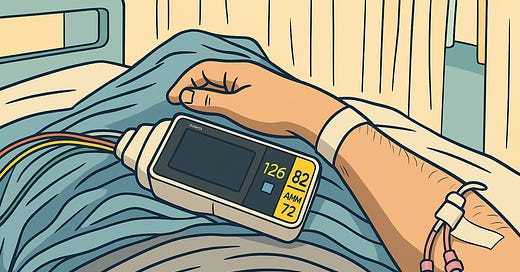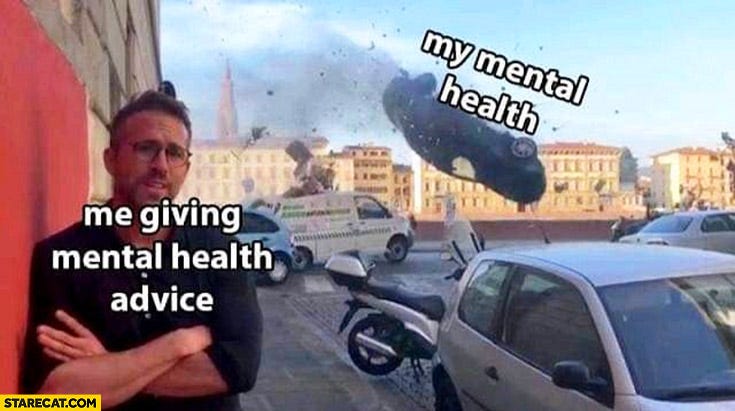Oops - I broke myself. Seems appropriate to share for mental health week.
I'm slowly on the mend, but perhaps this is a cautionary tale.
Ooops.
This is me in hospital a month ago.
I went to the doctor because I'd been light-headed for a few days.
The GP thought she heard an unusual heart rhythm, I couldn't walk for more than a few meters without almost passing out, they drove me in a ambulance to A&E, and then I found myself having two days stay in the hospital, in tears most of the time - half-worried I was going to die, half-worried about the client work I needed to do, half-worried about my children (despite them being safe and not even with me at the moment).
The doctors couldn't find anything wrong (which is both reassuring and frustrating).
The cardiologist saw me on Day 2.
"I think this is a vagal response - have you been under any stress recently?".
I chuckle/cried to myself.
A little, I said.
oOo
2024 was a horrific year for many of us freelancers, 2025 might have started out better - for me, work had just picked up, which was good, but something tipped me over the edge, and has prevented me from doing that work.
My body has said "enough is enough", and forced me into stopping.
The irony here, of course, is that my own biggest anxiety and stressors are income related (as is true for the majority of people, I'm sure). So reducing my stress levels by not working is counter-productive.
So, for us lot - the self-employed, when you get sick, unwell, unable to work - advice like "take some rest" can be hard to follow.
The problem is that it's not sustainable to avoid rest.
At some point, your body is going to force you to rest.
And when it's not on your terms, getting better, getting well, recovering is harder.
But there's a bigger story here, bigger than me - and the reality of the continual stress we can often find ourselves in when self-employed.
We have the stresses of delivering the work, chasing payment and dealing with poor communication, but also the constant stress of finding work, dealing with rejection, dealing with quiet periods, increased cost of living, being unable to take paid time off for rest or illness.
So many say “the future of work is freelance” - and this makes me fearful.
Not everyone is cut out for freelancing, more and more are being forced into self-employment - my prediction is this will only increase due to AI reducing perm workforces, and freelance work becoming a norm for more industries where hirers only need humans occasionally for complex or nuanced work, over automated busy work.
And without a support structure (because employers won't be providing it any more), what does that mean for the wellbeing of the population?
The longer term impacts are harder to track - but we are already anecdotally seeing increases in work related burnout from the past five years of societal stress. The job market is a mess. The economic market is a mess. Things are stressful enough, yet alone for those of us who have to constantly find the next job, and perhaps don't have a support structure in place.
And that’s why I have spent so many years focused on the importance of mental health in self-employment. Because it matters so much more when you’re doing it all for yourself.
oOo
So let’s get practical for a moment - what can you do to take better care of yourself when you’re freelancing?
For the last 7 years, I’ve run a project focusing on the mental health of freelancers (it’s called Leapers, you can take a look at our work over here), and I try to simplify things down into an ABC:
A - Active Awareness: check-in with yourself each week, and ask “How am I feeling this week?” and “What’s making me feel that way?”. Not only does taking a few minutes to reflect on the week help, you can build up a picture of how your wellbeing is changing over time AND what’s influencing it - positively and negatively.
B - Behaviours and Boundaries: once you’ve started to identify the things which take-away and add-to your mental health, you can start to make small changes to improve or sustain things. Perhaps you struggle with switching off at the end of the day? Perhaps you’ve been feeling a lack of confidence in pricing yourself? Maybe you’re just tired because you’re never resting? Perhaps it’s client behaviours which are the biggest drag. It’ll be different for everyone of course.
C - Community and Connection: perhaps the most important, but not doing it all yourself. Being part of a community of fellow freelancers can help immeasurably - not least because you’ll start to recognise that many of the challenges you’re facing and feeling are part of being self-employed, not any fault of your own. Too many freelancers face issues of isolation, and whilst it takes effort, making meaningful connections is essential for your wellbeing.
Let’s get even more practical
Even more tangibly, there are five foundational things you can starting to think about right now.
Financial Maturity - money is possibly the single biggest cause of anxiety and concern for freelancers, unsurprisingly. Yet also, so many freelancers don’t really have a good idea of what their incomings and outgoings need to be. Get on top of your finances. You might be worrying about income, when actually things are okay. Do a budget, understand your red lines, keep on top of your taxes, and get advice if you’re unsure where to start.
Physical Health - if you’re not getting good sleep, exercising, eating well, and getting some time outdoors, keeping your mental health in check is going to be harder. Physical and mental health are absolutely intertwined, so do the work. Your body (and bank balance) will thank you for it. Get off your butt right now in fact, drink a glass of water, go for a walk. I’ll still be here when you’re back.
Scheduled Rest - employees have a ‘use it or lose it’ policy with holiday, but we have the opposite problem. So scheduling rest, holiday and time off from work is essential. Consider setting yourself a minimum holiday policy - how many days MUST you rest for each year, or what’s the longest you’ll work for without a break? Schedule it early, so your body doesn’t schedule it for you.
Contracts - Doesn’t sound like a mental health topic, but we see far too many freelancers come up a cropper because they don’t have written agreements in place when they’re working. It can make scopes creep, it can be harder to chase late invoices, and it can be a safety net when things go wrong.
Purpose, focus and progress - this is a more complex one, but without knowing whether you’re progressing, excelling, developing - it can be easy to slip in a feeling that you’re not doing anything. One of the biggest negative impacts on mental health, after the rollercoaster of income, is a feeling of lack of confidence and lack of productivity. But if you don’t have measures against which you’re holding yourself accountable, it can be easy to feel lost. Having some simple statements around what you do, why you do it, and what success and progress looks like for you, can work wonders.
oOo
We all have mental health - it’s a measure, not a condition. So we all need to consider self-care, not as a nice to have, but as a foundation for working sustainably.
If don’t charge our laptops, we can’t work.
Let’s give ourselves permission to rest, recharge, and the self-care and attention we deserve, so we’re able to continue working too.
mk
Apologies for the lack of emails recently - I submit the above as to why I’ve been a little lacking in the sharing department. But as I redesign how I work, bear with me.
In order to help though - I’m looking for stories from fellow freelancers, as freelancing.support is ultimately about sharing experiences from all of us.
If you have a story you’d like to share about working for yourself, advice for others, or just a question you want to ask the experts, drop me a note.





